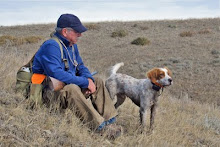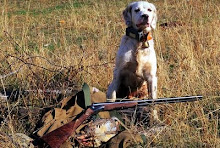
In a recent exchange on one of the Internet bird dog bulletin boards, breeder Scott Berg replied to a poster who suggested that a 'free' pup from a casual breeder is as good a prospect for the average hunter as a carefully bred pup form a conscientious and informed breeder. Here is his (edited) response...
The difference between free and $700 is $54/yr. The difference between the (pup from) a guy in the back yard and the most experienced, accomplished, and proven breeders as compared to a backyard breeder is about $300/pup or about $23/yr over a 13 yr lifespan.
Even the most conservative estimates suggest the average person spends $600/yr to feed and care for a dog. This does not consider training cost. And, even if you train the dog yourself, equipment, vehicle costs, birds, etc are not free. It’s quite reasonable to say that we spend $1,000yr on a dog. Therefore, the additional cost of buying a dog from the most accomplished breeders in the country vs a backyard breeder equates to 2.3% of what you spend on a dog annually. It’s rounding error.
Additionally, if we consider what we spend on hunting, training, and possibly trialing I put on 20,000 miles a year doing those things. If we use the IRS estimate of 45 cents a mile that’s $9,000/yr. For a modestly serious hunter, let’s say they don’t spend a dime at shooting preserves or have a lease, between vehicle costs, hotel, shells, license, equipment, what would you estimate they spend? Obviously, expenditures vary vastly but to estimate $2,000/yr would be conservative for anyone we could call a serious hunter with the possible exception of someone with unlimited land access in very close proximity to their home and no desire to travel to other places. Between the dog and actually hunting we are talking minimally $3,000yr. In this context, 23 bucks looks very insignificant. I guess if the individual has two dogs it’s 56 bucks.
Your position suggests that relative quality is somehow improved because a breeder has one or two litters each year. There is absolutely no relevance or correlation between number of litters and relative quality. That is determined by the degree of selectivity and the quality of the selection process applied by the breeder.
Even the most conservative estimates suggest the average person spends $600/yr to feed and care for a dog. This does not consider training cost. And, even if you train the dog yourself, equipment, vehicle costs, birds, etc are not free. It’s quite reasonable to say that we spend $1,000yr on a dog. Therefore, the additional cost of buying a dog from the most accomplished breeders in the country vs a backyard breeder equates to 2.3% of what you spend on a dog annually. It’s rounding error.
Additionally, if we consider what we spend on hunting, training, and possibly trialing I put on 20,000 miles a year doing those things. If we use the IRS estimate of 45 cents a mile that’s $9,000/yr. For a modestly serious hunter, let’s say they don’t spend a dime at shooting preserves or have a lease, between vehicle costs, hotel, shells, license, equipment, what would you estimate they spend? Obviously, expenditures vary vastly but to estimate $2,000/yr would be conservative for anyone we could call a serious hunter with the possible exception of someone with unlimited land access in very close proximity to their home and no desire to travel to other places. Between the dog and actually hunting we are talking minimally $3,000yr. In this context, 23 bucks looks very insignificant. I guess if the individual has two dogs it’s 56 bucks.
Your position suggests that relative quality is somehow improved because a breeder has one or two litters each year. There is absolutely no relevance or correlation between number of litters and relative quality. That is determined by the degree of selectivity and the quality of the selection process applied by the breeder.
For example, Breeder X could have two producing females and have evaluated four females to get those two females. This is quite common in the scenario you have posed. Breeder Y could have 10 producing females but evaluated 100 females to get those 10 females. Breeder Y has practiced 5X the degree of selectivity. Of course, the relative quality of the parents would be particularly important. I think it’s pretty logical to assume that if both breeders have been breeding for the same number of years, Breeder Y’s producing females will also be superior after having applied this degree of selectivity for a number of years. Breeder Y also will accumulate considerably more experience in the selection process over the years. Bob Wehle, taken as an example, was probably quite a bit better at this process than a guy with a couple dogs in the backyard..."
What do they say about opinions? Everyone has one... or something?
Merry Christmas!









5 comments:
That's a fascinating perspective. And one that can be flipped around: if the actual $$$ investment over a lifetime is slim, then why not just get a 'free' pup? The challenge then becomes as to how you invest your $$$ to stand a better chance of a better dog? Scott seems to suggest that prospective buyers should therefore invest both time and cash in visiting a breeder, seeing multiple dogs run, over multiple years, and asking for references. Sounds sensible to me.
And a happy holiday season to all our readers from me, too!
Andrew
It's not necessarily so black & white. In general larger well-run kennels should achieve quicker results than smaller operations. Though it depends a bit how dedicated and knowledgeable the "backyard breeder" is, before they should be completely written off.
Merry Christmas to you and pls keep this excellent blog going!
Regards
Frank-Tommy Olsen
New Zealand
www.huntfishdive.com
How about the Pepsi analogy?
I have heard nothing but good things about Scott and his dogs.
From my point of view, the cost of the pup is not relevant, within reason. I'm more concerned about the value of my time any how much I enjoy myself when in the field. I'm still a member of the working class and have limited time for dogs, hunting, and the other things that I love. If an extra $500 for a pup will give me a signifcant chance of a more enjoyable hunt then I'll go that way without thinking twice.
Post a Comment